Tenants raise concerns about Detroit rentals, push for landlord accountability
Arica Crowder has struggled to get repairs in her Detroit apartment, even as she repeatedly called her landlord’s maintenance line.
Down in the basement one September afternoon, dark brown sludge sat in sinks. A stench filled the air, wafting into her unit. She said she worried about her children’s health. Her family’s home was rife with problems: doors were detached, the living room ceiling bubbled and a lock didn’t work. It is not yet up to code.
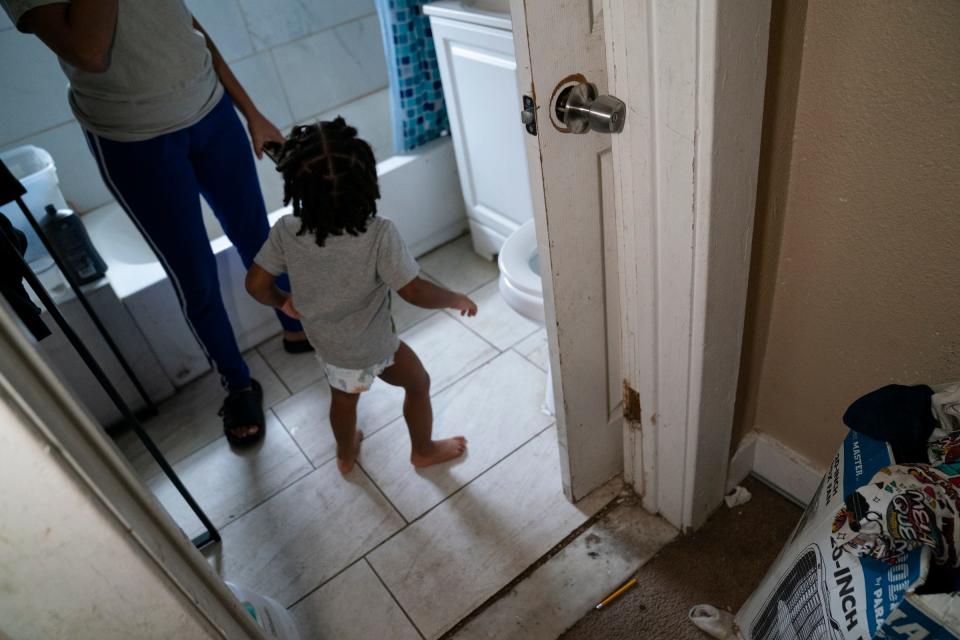
“I can’t even wash my clothes or anything right now. … I can’t do anything,” Crowder, 26, said at the time.
Crowder moved into the unit more than a year ago and faces eviction after withholding rent because of her struggles to get repairs done, she said. Her next court date is in January.
At a Detroit City Council committee meeting last month she detailed the work needed in and around her home —and since then the issues are being addressed. Other tenants with the same property manager — Munoz Realty — joined Crowder, alongside members of the advocacy group Moratorium NOW! Coalition. They are raising concerns about renters facing eviction for nonpayment, despite needing crucial repairs in their homes.
A report prepared for the council by the city’s Building, Safety Engineering and Environmental Department (BSEED) lists more than 320 blight tickets against properties held or managed by Munoz Realty.
While Munoz Realty has come under scrutiny by Detroit City Council, it’s unclear how the property manager’s track record compares with others across the city, where tenant advocates have long lamented poor living conditions in rental properties.
More:Detroit taps nonprofit to run eviction defense program to launch in January
More:Who owns rental housing in Detroit? New report offers glimpse
At Large Detroit City Council Member Mary Waters, who requested the report from BSEED, broadly called for state assistance to “tackle the issues that our tenants face.”
“Despite our efforts at enforcement at the local level, we are seeing landlords who consider our fees and fines just the cost of doing business, and they make no effort at long-term improvements to their properties,” Waters said in a statement Thursday.
The City of Detroit in recent years has made efforts to increase the number of properties with required certificates of compliance, which indicate a property is up to code. But renters and advocates say shoddy housing and difficulty in obtaining repairs are persistent issues, especially in dwellings affordable for low-income households. One recent study found that the properties in 89% of eviction cases filed in the city during the COVID-19 pandemic were not up to code. Detroit renters were also more likely to live in inadequate housing — dealing with major problems like electric and plumbing issues — than homeowners.
Crowder and other tenants who spoke to the Free Press and BridgeDetroit say they have had difficulty getting their management company to make repairs on their rental homes. Their landlord is listed on some documents as Munoz Realty and others as Detroit International Holdings LLC, according to lease and court records.
Gaston Muñoz is the CEO and a broker at Munoz Realty, a southwest Detroit-based real estate firm that he said was established in 2011. He is also the registered agent of “Detroit International Holding LLC,” which has the same address as Munoz Realty, according to state business records.
“We have a system in place. A tenant calls or texts their issue(s) to our repair telephone line and within 48 to 72 hrs the issues are resolved,” Muñoz said in an email to the Free Press on Thursday
He said the concerns renters raised are "alleged problems based on hearsay." Muñoz declined to say how many properties Detroit International Holdings leased in Detroit.
“My company, Munoz Realty, has helped to rehab thousands of abandoned houses in Detroit,” he said, pointing to news stories about Munoz Realty building a wheelchair ramp and helping a family after a house fire.
Muñoz has 16 years of experience in real estate and rehabbed 450 properties in the city in 2021, according to a 55-page document he supplied, which included his biography as well as photos and references to several awards and community events showing Muñoz’s participation. Muñoz said he sits on the board of directors for the Detroit Association of Realtors.
City issues more than 18,000 blight tickets for rentals across Detroit
Crowder said it’s been “repair after repair” since she moved in.
After she spoke out at a council meeting about Munoz Realty, her landlord cleaned out her basement sink and fixed her broken bathroom faucets, she said. But she’s been washing her clothes in her tub in case the sludge resurfaces.
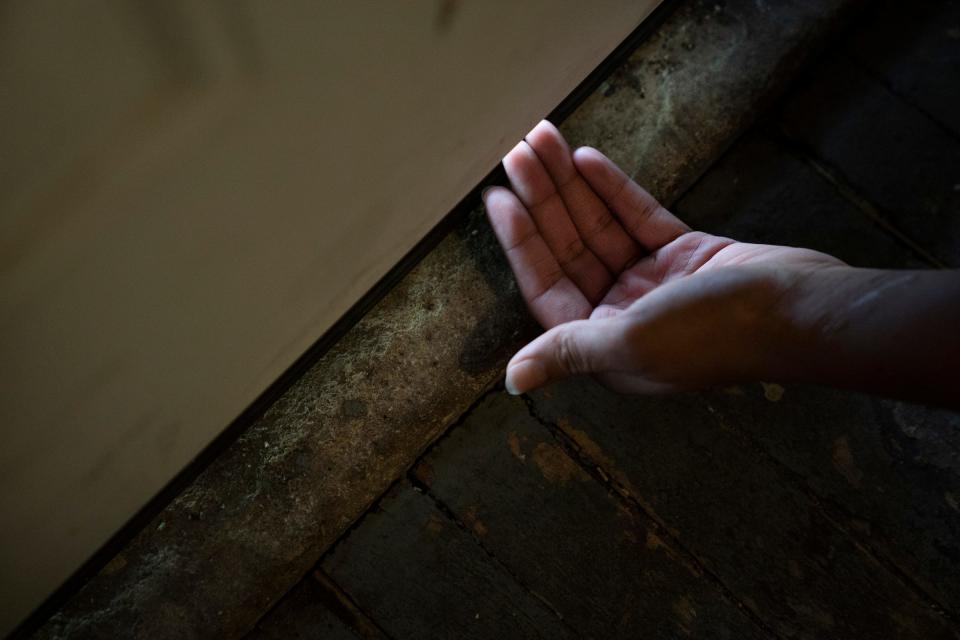
“This building was completely renovated prior to leasing to any tenants,” Muñoz said.
The building Crowder lives in failed an inspection last month, according to BSEED records obtained through a Freedom of Information Act request. Among the recommendations: seal up an entryway to keep rodents out and secure detached doors.
The city ordered the owner — listed in BSEED’s records as Detroit International Holding LLC — to make corrections before Nov. 5. On Saturday, Crowder said her landlord fixed three detached doors. This week, they changed the filters in her furnace and she is expecting them to return and fix a cabinet in her kitchen, she said.
Muñoz said in an email Monday that they replaced the front door to the unit, repaired downspouts, secured balcony railings and a handrail, sealed the chimney, installed window locks, and sealed a rear door to prevent rodents from entering the property. They expect to replace the kitchen cabinet in a unit by Wednesday, he said.

As of this week, the property did not have a certificate of compliance, according to the city’s rental compliance map. Muñoz said Thursday that the company is working to get the certificate of compliance.
Detroit City Council President Mary Sheffield said earlier this month that the council is aware of the complaints against Munoz Realty and the city’s legislative body is reviewing the compliance status of his properties.
“Munoz Realty has an agreement with BSEED that encompasses all blight,” Muñoz said, referring to the report BSEED received regarding Munoz Realty’s blight tickets.
A BSEED spokesperson said Friday the department is working with Muñoz to bring his properties into compliance but there are no agreements at this time.
Under the City of Detroit’s rental ordinance, landlords must keep their properties safe by registering them, passing inspections, getting a lead clearance and paying any outstanding fees or blight violation tickets. These steps lead to a certificate of compliance.
The city has issued an increasing number of certificates of compliance in recent years – more than 3,700 in 2019 and more than 7,800 through September of this year.
Though it’s hard to say how many rentals do not have certificates of compliance, one U-M study found that, as of March 2022, 6% of Detroit’s 87,000 rental properties were up to code.
“We're still actively going and identifying known rental properties in the city and if they are not in compliance, we are ticketing those landlords or property management companies,” said Julie Fowler, BSEED project manager supervisor, noting last month that the department has about 20 inspectors on that task.
From January to September, the city issued about 18,000 blight tickets to rental properties. Of those blight tickets, more than 7,800 were issued to properties that did not have a certificate of compliance at the time of an inspection or enforcement efforts.
Inspector: Broken stairs and leaking wall
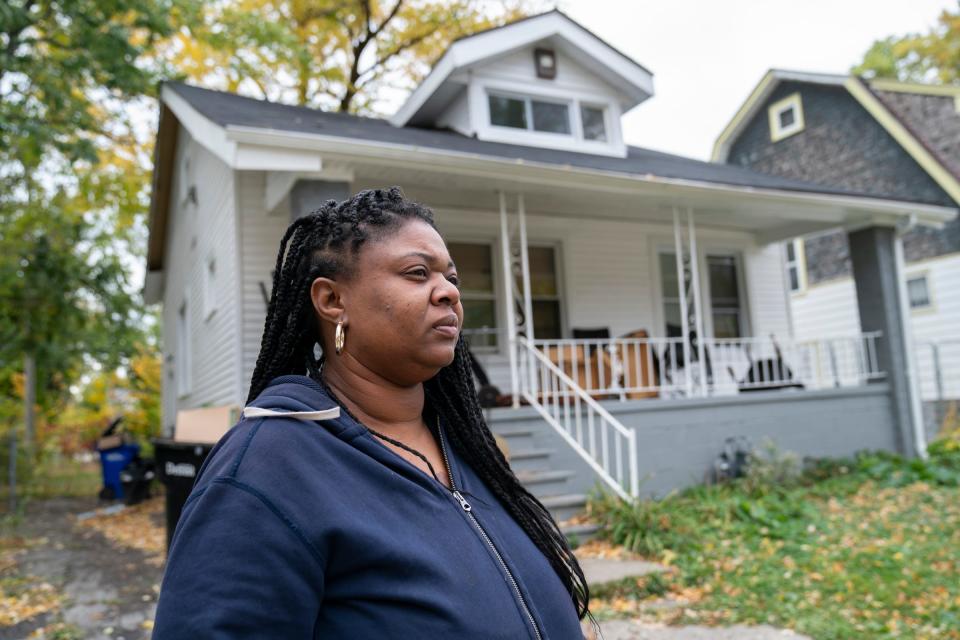
Elisha Maxwell moved into a home, leased to her by Detroit International Holdings LLC, on the city’s westside about a year ago, but has since moved out.
“As the months went by, you slowly started to see things fall apart,” Maxwell, 42, said. There were cracks in the wall, she said, and cabinets were falling off. The stairs to the kids’ room were “dry rotted,” she said.
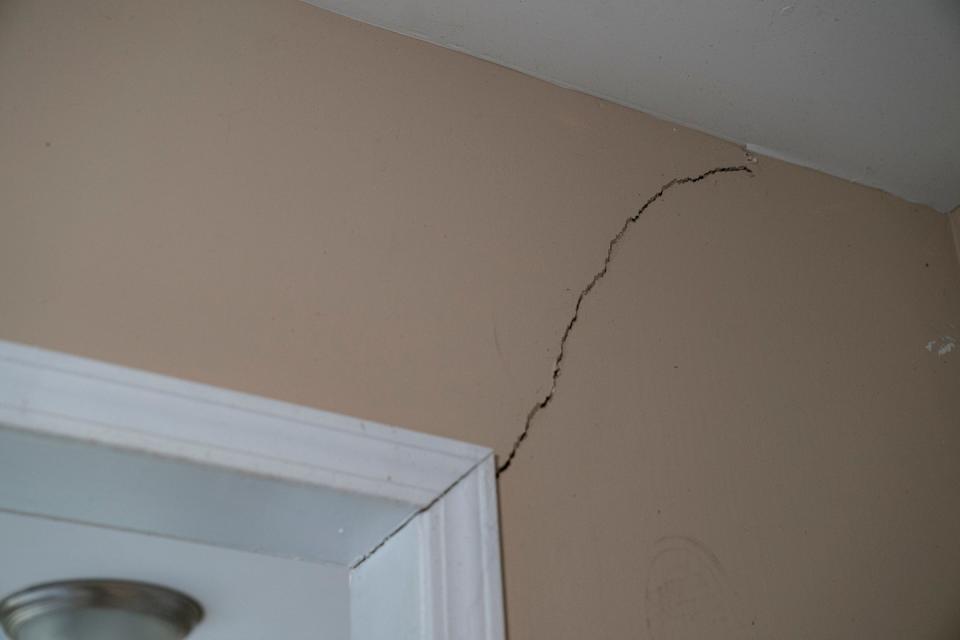
The property received a lead clearance at the end of last year and passed a third party inspection in February, according to BSEED, but records show that the home failed a city inspection in July. The inspector found broken stairs inside the house and a basement wall “bowed in and leaking.” Detroit International Holdings had about a month to get into compliance.
“The tenant caused $18,000 in damages to the property. The tenants lived in this property for 10 months; however, their rent arrearage totals $7,500,” Muñoz said.
Maxwell denied the damages. She could not say how much she owed in rent, but said the amount the landlord claims she had in arrears is excessive.
A nonprofit paid a few months of rent, Maxwell said. Her landlord filed an eviction case for nonpayment and she had to move out by October, according to court records. Maxwell said she withheld rent because of the home’s conditions.
“I have to understand that it was for non-payment, but they have to understand that they have to do the work as well,” she said. She lived in the home with her children and grandchild, but is now staying in a hotel.
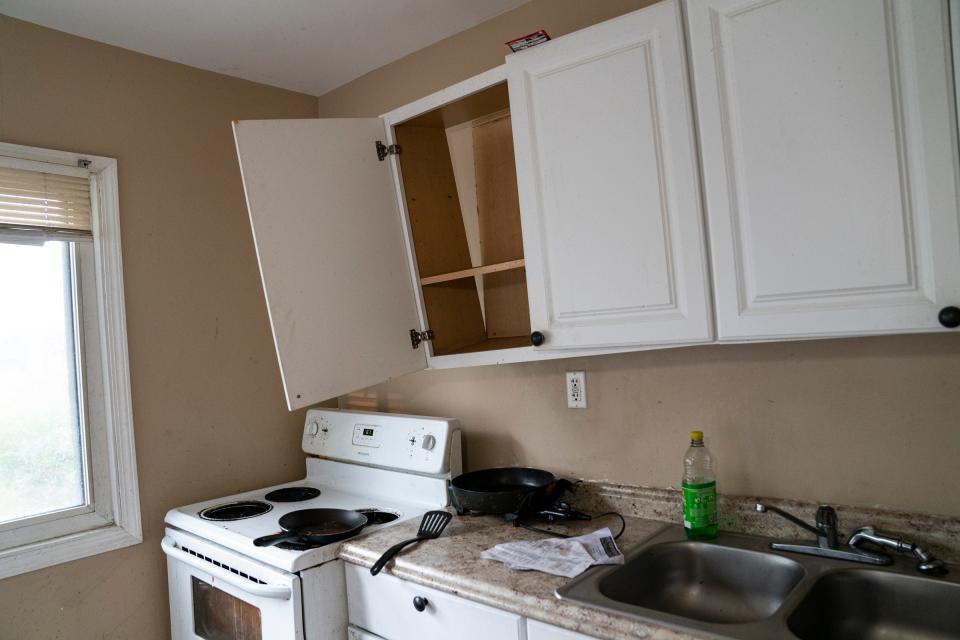
Maxwell said she repeatedly reported issues to her landlord and heard back only a couple of times. Her landlord put up a banister and did some plumbing work but didn’t address the home’s other issues, she said.
The city’s rental compliance map shows that, as of Saturday, the property had a certificate of compliance.
Properties in most eviction cases were not up to code
Renters might occupy homes in substandard or dangerous conditions because it’s a decision between having a roof over one’s head or not, said Alexa Eisenberg, a postdoctoral research fellow with the University of Michigan’s Poverty Solutions initiative.
“They really don't have a choice in where they're living because of the lack of affordable housing, lack of housing subsidies, lack of public housing. This is really the area of the market where single mothers, children, disabled people are stuck in housing of last resort that is really dangerous for their health,” Eisenberg, whose research focuses on housing, said.
The Eviction Machine, an advocacy and research tool part of the Urban Praxis Workshop, found that between January 2021 and July 2022, about 86% of eviction cases filed in Detroit included properties that were not up to code.
“After a single eviction takes place, people are stuck in a cycle of eviction, so housing instability is often a lifetime occurrence,” Eisenberg said.
Detroit International Holdings is one of the city’s “top evictors,” according to the Eviction Machine. Between March 2020 and July 2022, the landlord filed 281 eviction cases, the data shows. The vast majority were for nonpayment and 77% of the cases involved properties that were not in compliance with the city’s rental ordinance at the time of the filing.
Muñoz said each eviction is “separate and distinct.”
“I would need an address so I can provide you with a specific answer. However, in general, all these cases were resolved with a consent agreement between the tenant and the landlord, and approved by the respective court,” Muñoz said.
Three tenants told the Free Press they were withholding rent because of repair issues.
“Michigan law allows any tenant to escrow their rent with the City of Detroit should a landlord fail to reasonably address repairs. None have done so,” Muñoz said.
‘I want to run out of here’
Detroit City Council members voiced concerns as Crowder, Maxwell and other tenants spoke out about the state of homes managed by Munoz Realty.
“This just begs the question of how much do we not know, and also, how much do residents not know when it comes to their tenants’ rights,” Detroit City Council Member Gabriela Santiago-Romero told the Free Press last month.
Santiago-Romero, who represents Detroit’s 6th District and chairs Detroit City Council’s Public Health and Safety standing committee, said it was disturbing to hear from tenants about their living conditions. Her office, she said, was working with BSEED to inspect the homes of the tenants who came forward during a council meeting.
Tenants who have problems can schedule an inspection, Fowler said. If inspectors find code violations, they will issue a correction order to repair the issue. BSEED then determines how long the landlord has to fix the problems, ranging from three to 30 days depending on if it’s deemed an emergency. If the landlord doesn’t comply, BSEED will issue a blight ticket based on the violations. That could cost anywhere from $50 to $2,000, she said.
“We respond to all complaints regardless of the landlord in a reasonable amount of time that allows us to get all of our work done. Regardless of who the landlord is, we would treat everything the same,” Fowler said.
The city over the summer announced a $5 million repair program for landlords, backed by federal pandemic relief aid, to bring more than 1,000 rental units up to code. The program will also include dollars to turn vacant, second-story apartment units within commercial corridors into housing, plus training and matching grants to bring units up to code. Estimated launch dates for when the different parts of the program will start taking applications range from this month to May of next year.
Rental compliance is an ongoing challenge in Detroit made more difficult by limited information on how many rentals there are in the city and who owns them. There have been recent strides to pin that data down.
Tenants, meanwhile, are frustrated.
Gannon Mathis and Shatiea Tidwell, who live in a unit on the city’s east side with their five children, said their home has mice and cockroaches. It took six months for their landlord to repair a crack on one wall and a hole in their bathroom ceiling stayed open for about two months until their bathroom was remodeled, they said.
Since the pair spoke out at a council meeting, Tidwell said their landlord – Detroit International Holdings – has secured loose floor jacks and put in new carpet, but there are other issues they are still dealing with like the pests.
“I want to run out of here but it's like where am I running to? To sleep in my car, to sleep at a hotel? Like, I don't have anywhere else to go,” Tidwell, 33, said last month.
Muñoz said the building was “completely renovated prior to leasing to any tenants,” and that “mice and roaches issues are not the responsibility of Munoz Realty pursuant to our lease agreements because they typically arise due to tenant housekeeping.”
Mathis and his family are facing eviction for nonpayment. The property as of this week did not have a certificate of compliance. Since 2020, the property received two correction orders with “Detroit International Holding” listed as the owner.
“Everything is subpar. It’s just terrible — our conditions of living,” Mathis, 48, told council members last month.
Muñoz said in a Monday email that his company cleaned a drain on the property, cleaned and sanitized the basement and sealed gaps by doorways with concrete to prevent rodents from entering the home.
Resources for Renters
To check if a rental is registered and has a certificate of compliance, go to https://bit.ly/RentalComplianceMap.
Tenants who want to schedule a complaint inspection can call BSEED at (313) 628-2451 or complete an online form at https://bit.ly/RentalComplaints.
If BSEED finds code violations, the department will issue a “correction order” for the landlord to repair the violations. If the landlord does not fix the issues, they could be ticketed.Outlier Media has put together a guide for how tenants can research their landlord before signing a lease. Go to https://bit.ly/outlierlandlordresearch.
Michigan Radio also has a resource guide for renters. Go to https://bit.ly/MichiganRadioRentersGuide.
Detroiters can call the City of Detroit’s Eviction Prevention Hotline if they need assistance. Call 866-313-2520 or visit detroitevictionhelp.org.
This article originally appeared on Detroit Free Press: Tenants raise concerns about Detroit rental properties

